外研版(2019)选择性必修二Unit 2 Improving yourself Review精品课件(22张PPT)
文档属性
| 名称 | 外研版(2019)选择性必修二Unit 2 Improving yourself Review精品课件(22张PPT) | 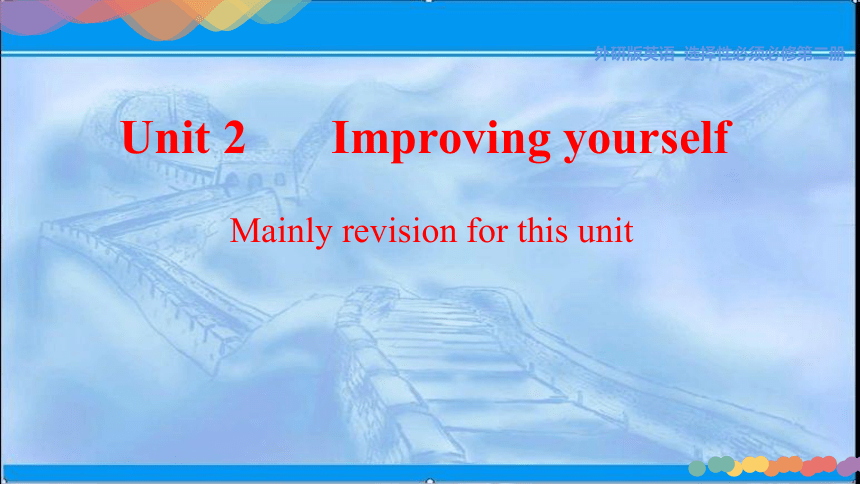 | |
| 格式 | ppt | ||
| 文件大小 | 1.1MB | ||
| 资源类型 | 教案 | ||
| 版本资源 | 外研版(2019) | ||
| 科目 | 英语 | ||
| 更新时间 | 2021-01-19 15:48:10 | ||
图片预览

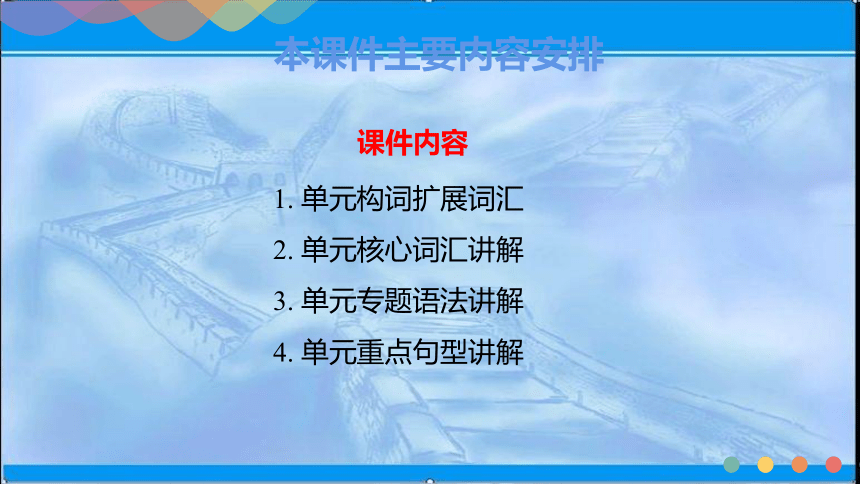
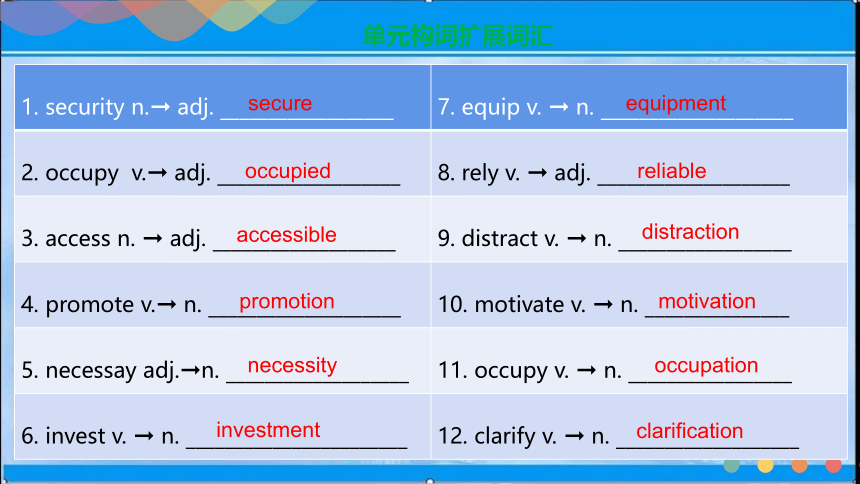
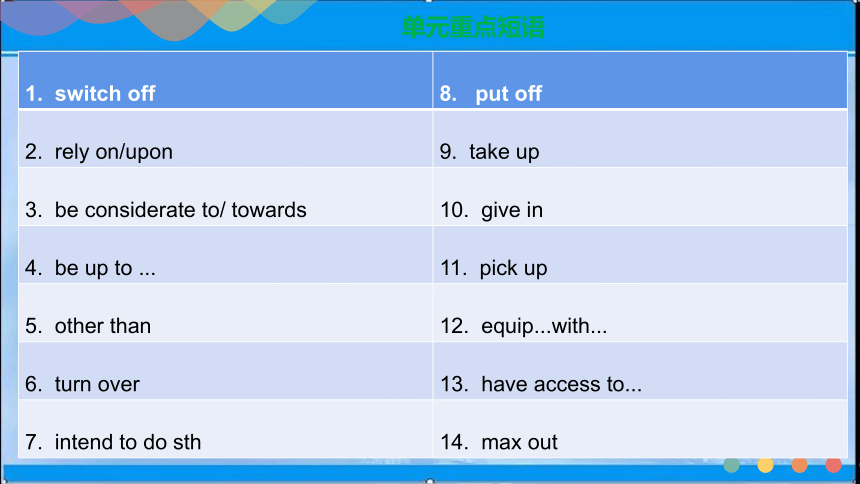
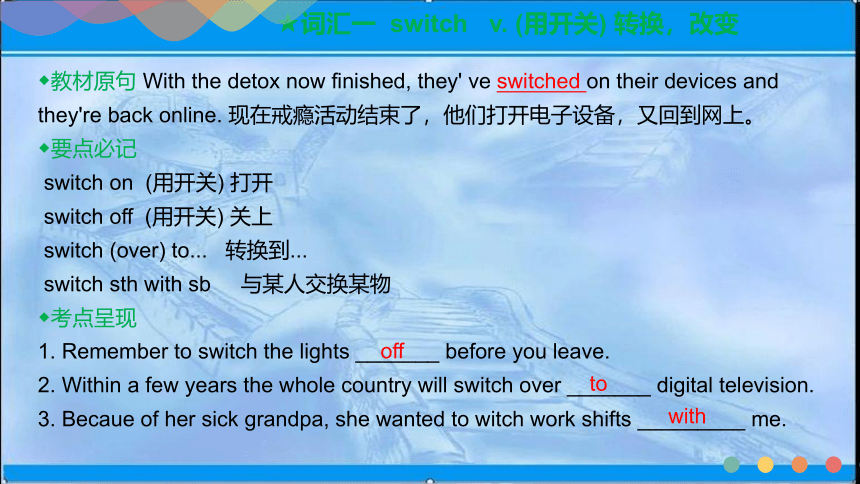
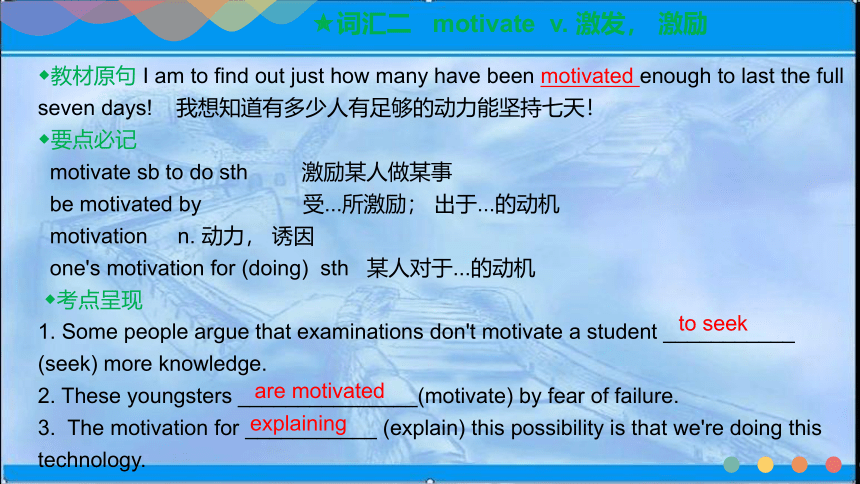
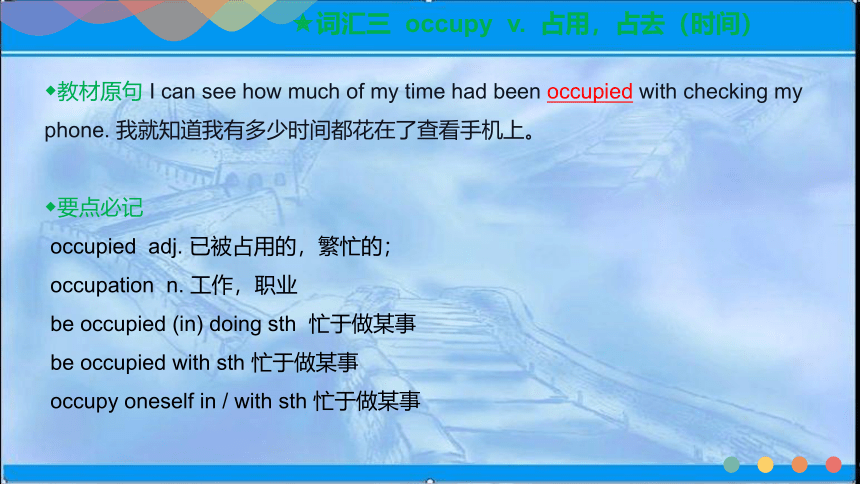
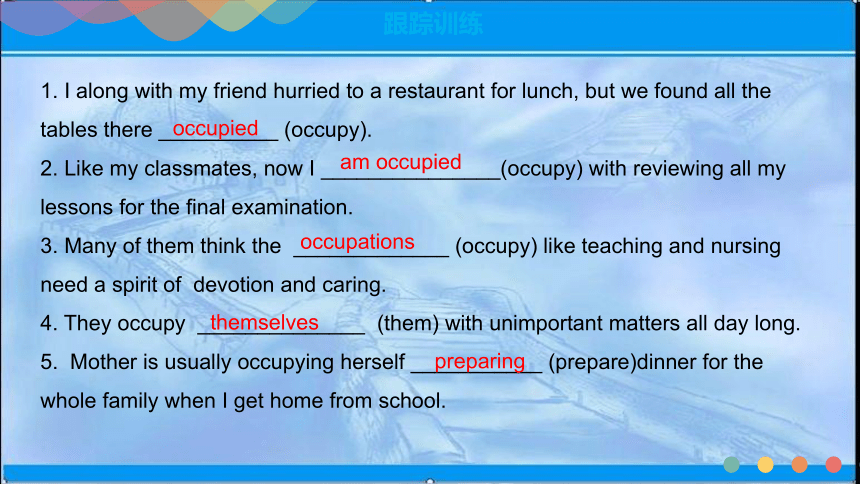
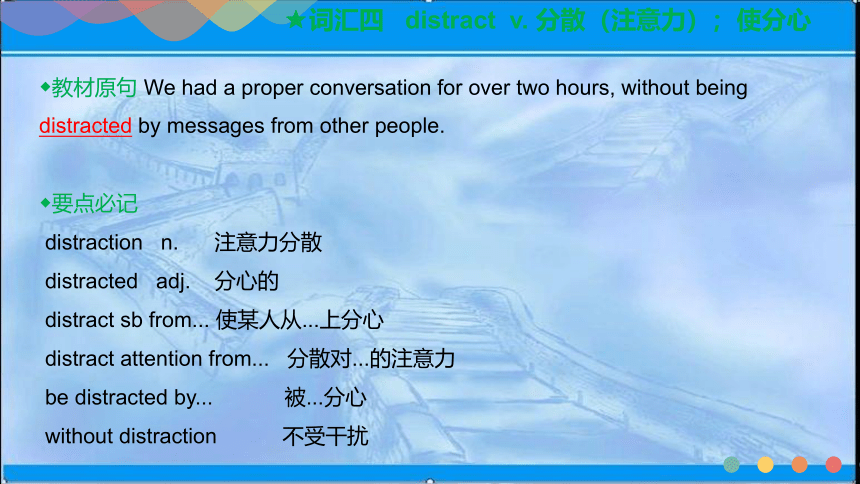
文档简介
外研版英语 选择性必须必修第二册
Unit 2 Improving yourself
Mainly revision for this unit
本课件主要内容安排
课件内容
1. 单元构词扩展词汇
2. 单元核心词汇讲解
3. 单元专题语法讲解
4. 单元重点句型讲解
单元构词扩展词汇
1. security n.? adj. __________________
7. equip v. ? n. ____________________
2. occupy v.? adj. ___________________
8. rely v. ? adj. ____________________
3. access n. ? adj. ___________________
9. distract v. ? n. __________________
4. promote v.? n. ____________________
10. motivate v. ? n. _______________
5. necessay adj.?n. ___________________
11. occupy v. ? n. _________________
6. invest v. ? n. _______________________
12. clarify v. ? n. ___________________
secure
occupied
accessible
promotion
necessity
investment
equipment
reliable
distraction
motivation
occupation
clarification
单元重点短语
1. switch off
8. put off
2. rely on/upon
9. take up
3. be considerate to/ towards
10. give in
4. be up to ...
11. pick up
5. other than
12. equip...with...
6. turn over
13. have access to...
7. intend to do sth
14. max out
?词汇一 switch v. (用开关) 转换,改变
◆教材原句 With the detox now finished, they' ve switched on their devices and they're back online. 现在戒瘾活动结束了,他们打开电子设备,又回到网上。
◆要点必记
switch on (用开关) 打开
switch off (用开关) 关上
switch (over) to... 转换到...
switch sth with sb 与某人交换某物
◆考点呈现
1. Remember to switch the lights _______ before you leave.
2. Within a few years the whole country will switch over _______ digital television.
3. Becaue of her sick grandpa, she wanted to witch work shifts _________ me.
off
to
with
?词汇二 motivate v. 激发, 激励
◆教材原句 I am to find out just how many have been motivated enough to last the full seven days! 我想知道有多少人有足够的动力能坚持七天!
◆要点必记
motivate sb to do sth 激励某人做某事
be motivated by 受...所激励; 出于...的动机
motivation n. 动力, 诱因
one's motivation for (doing) sth 某人对于...的动机
◆考点呈现
1. Some people argue that examinations don't motivate a student ___________ (seek) more knowledge.
2. These youngsters _______________(motivate) by fear of failure.
3. The motivation for ___________ (explain) this possibility is that we're doing this technology.
are motivated
to seek
explaining
?词汇三 occupy v. 占用,占去(时间)
◆教材原句 I can see how much of my time had been occupied with checking my phone. 我就知道我有多少时间都花在了查看手机上。
◆要点必记
occupied adj. 已被占用的,繁忙的;
occupation n. 工作,职业
be occupied (in) doing sth 忙于做某事
be occupied with sth 忙于做某事
occupy oneself in / with sth 忙于做某事
跟踪训练
1. I along with my friend hurried to a restaurant for lunch, but we found all the tables there __________ (occupy).
2. Like my classmates, now I _______________(occupy) with reviewing all my lessons for the final examination.
3. Many of them think the _____________ (occupy) like teaching and nursing need a spirit of devotion and caring.
4. They occupy ______________ (them) with unimportant matters all day long.
5. Mother is usually occupying herself ___________ (prepare)dinner for the whole family when I get home from school.
themselves
occupations
preparing
am occupied
occupied
?词汇四 distract v. 分散(注意力);使分心
◆教材原句 We had a proper conversation for over two hours, without being distracted by messages from other people.
◆要点必记
distraction n. 注意力分散
distracted adj. 分心的
distract sb from... 使某人从...上分心
distract attention from... 分散对...的注意力
be distracted by... 被...分心
without distraction 不受干扰
跟踪训练
1. Tommy admits that playing games really distracts him _________ his studies.
2. When working, one should concentrate his mind on it and not allow oneself to _______________ (distract).
3. ______________(distract) by the games, the pupil has already left behind in a few subjects.
4. Without the ___________ (distract) of TV, they might sit around together after dinner and actually talk to one another.
5. You must develop self-discipline to start your work as quickly as possible and continue until you have finished without ___________________(distract)
be distracted.
from
Distracted
distraction
being distracted.
◆教材原句 I knew there was a party happening that evening, but without access to social media,...我知道那天晚上有一场派对,但我无法使用社交媒体,...
◆要点必记
accessible adj. 可进入的, 可使用的
be accessible to... 可进入的, 可使用的
access to sth 去...的通道
have easy/ no access to ... 容易/ 没有机会接触...
◆考点呈现
1. The heavy snow has cut off the access _______ the mountain village.
2. It's a pity that people in that mountain area had _______ access to education.
3. The young manager can be ___________ (access) to his staff.
?词汇五 access n. 接触的机会;得到的权利
accessible
no
to
◆教材原句 While the Spending jar is about the here and now, the Saving jar gives you a vision for the future. 存钱罐着眼此时此地,而存钱罐却给你一个未来愿景。
◆要点必记
visual adj. 视觉的,视力的
have a vision of... 有...的构想
have good/poor vision 视力好╱差
beyond one's vision 在视觉以外
◆考点呈现
1. He had _____ vision of a world in which there would be no wars.
2. The building which makes a _______ (vision)impact was built ten years ago.
3. _____________ my vision, I can not recognize who it may be.
?词汇六 vision n. 构想,设想;视力
visual
a
Beyond
◆教材原句 In this way, they will be better equipped in their adult lives to make informed choices about how they use the money they have. 这样,他们在成年后就有了更好的准备, 可以合理选择如何使用自己的钱。
◆要点必记
equipment n. 装备,设备
equip... with ... 用...装备...
be equipped with 配备有...
be equipped for 对...有准备, 有...能力胜任
two pieces of equipment (不可数名词)
?词汇七 equip v. 使能够胜任;使...有知识;配备
跟踪训练
1. All riders ________________ (equip) with reflective vests and safety lights.
2. When they leave school, they will be equipped ________ obtaining office jobs.
3. There are three conference rooms ___________ (equip) with a screen, flipchart and audio visual devices.
4. First, you should equip yourself ________ the knowledge you can acquire. Only thus can you be confident of yourself.
5. At present, relief agencies are stepping up efforts to provide food, shelter, and agricultural ____________ (equip).
are equipped
for
equipped
with
equipment
语法 过去完成时的被动语态
◆ 定义:
1. 表示在过去某一时间或动作发生之前已经发生或完成的被动动作。
2. 表示从过去某一时间开始延续到过去另一时间的被动动作。
◆ 基本结构:
1. 肯/否定式: “主语+ “had(not) been done”;
2. 一般疑问: “Had +主语+ been done”
◆ 判断应用(看时间,判语境)
1. 定义法:
2. 时间标志: by,before,when, +过去时间或时间状语从句;
3. 语境:如,
a. 主句为过去时,后接的宾语从句中的动作在主句动作之前已经发生的被动动作;
b. “It was the first/ second...time that-clause中,从句发生的被动动作;
c. 与过去事实相反,且从句发生的被动动作。
跟踪训练
1. I paid a visit to the town last spring to see how the antipoverty program _______________(carry) out in the last season.
2. By the time Tommy arrived at the city, his father ____________(send) to Germany for foreign affairs.
3. The oil painting that _______________ (lose) was found and returned to the local museum.
4. A rescue worker risked his life saving three tourists who ______________ (trip) in the forest for hours.
5. Luckily, the forest fire ____________(put) before it came to the residents nearby.
6. It was the second time that his e-bike _________________ (steal)
had been carried
had been sent
had been lost
had been tripped
had been put
had been stolen
单元重点句型
1. With the detox now finished, they' ve switched on their devices and they're back online.现在戒瘾活动结束了,他们打开电子设备,又回到网上。
【句型分析】
划线部分为with的复合结构,即:with +宾语+ 过去分词作宾语补足语。
【句型拓展】
a. with +宾语(名词/代词)+ 现在分词(表示与宾语构成主动关系,或动作正在进行)
b. with +宾语(名词/代词)+ 过去分词(表示与宾语构成被动关系,或动作已经完成)
c. with +宾语(名词/代词)+ 不定式 (表示动作未发生)
d. with +宾语(名词/代词)+ 形容词/ 小品词/ 介词短语
理解应用
1. With more countries _____________ (recognize) its role in international affairs, China's image is improving steadily.
2. With all schoolwork __________ (finish), I can spare time to go with my friends for shopping.
3. With something important ________ (talk) about with the opponent, the manage had to stay there another week.
4. The child is afraid of the night and sleep with the light ________.
5. During my whole report, he sat with his eyes ___________ (close) and his fingers interlaced
recognizing
finished
to talk
on
closed
2. Printed on each umbrella were short statements about... 每一把伞上都印有关于...的简短生命。
【句型分析】
本句采用了完全倒装句结构: 过去分词短语+ be + 主语。
即:Printed on each umbrella + were + short statements about...。为了保持句子平衡或上下文衔接紧密,可以把介词短语、形容词或分词短语前置,将主语与谓语全部颠倒。
【句型拓展】
1. 方位副词here/there; 时间副词then/now位于句首,有谓语动词为come/go/leave/run/fly/move等去向性动词时,句子主谓常完全倒装;
2. There be/ appear/ lie/ live/ stand/ remain/ exist等表示存在的动词为谓语的句子,属完全倒装;
3. 一些小品词,特殊类的副词如away/ down/up/ off/ in/ out/ over/ round 等谓语句首的句子。
单元重点句型
理解应用
1. ________ (bury) in the sands was an ancient village called Loulan.
2. Tommy has waited for long. Now __________ (come) his turn.
3. Once upon a time there _______ (live) a man known by the name of Jerry.
4. Here ________ (be) always some tips to help you win over people in the neibourhood quickly.
5. Look! There __________ (stand) an old temple which was built by thousands of working poeple in the Ming Dynasty.
6. At the meeting place of the Yangtze River and the Jialing River _______(lie) Chongqing, one of the ten largest cities in China.
Buried
comes
lived
are
Stands
lies
单元重点句型
3. On receiving a Kare Bag, one woman said, “You make me feel like a human being.” 在收到一个Kare包时,一位女士说,你让我感觉像一个人。
【句型分析】
upon/on doing sth, 意为“一....就....”, 充当时间状语,表示与另外一个动作或事件几乎同时发生。 相当于as soon as +从句。
【句型拓展】
a. at the sight/ sound of... 一看到/听到,....
b. immediately/ instantly/ directly+句子,一...就...
c. The memomt/ minute/ second/ instant+句子,一...就...
d. hardly/ scarcely (谓语过去完成时)... + when-从句 (谓语用一般过去时)
e. no sooner (谓语过去完成时)... + than-从句 (谓语用一般过去时)
理解应用
1. Upon _____________(arrive) at there, the students from other countries were imppressed by the unique tea pot and tea cups.
2. Hardly had he stepped on the stage when the guests ____________ (stand) up with hands up.
3. __________ the sight of the police officers, they ran off.
4. Other children tried to take it away from him _____________(immediate) one of the boys just had the cookie in hand.
5. No sooner had I sat down _________ there was a loud knock on the door.
arriving
stood
At
immediately
than
Unit 2 Improving yourself
Mainly revision for this unit
本课件主要内容安排
课件内容
1. 单元构词扩展词汇
2. 单元核心词汇讲解
3. 单元专题语法讲解
4. 单元重点句型讲解
单元构词扩展词汇
1. security n.? adj. __________________
7. equip v. ? n. ____________________
2. occupy v.? adj. ___________________
8. rely v. ? adj. ____________________
3. access n. ? adj. ___________________
9. distract v. ? n. __________________
4. promote v.? n. ____________________
10. motivate v. ? n. _______________
5. necessay adj.?n. ___________________
11. occupy v. ? n. _________________
6. invest v. ? n. _______________________
12. clarify v. ? n. ___________________
secure
occupied
accessible
promotion
necessity
investment
equipment
reliable
distraction
motivation
occupation
clarification
单元重点短语
1. switch off
8. put off
2. rely on/upon
9. take up
3. be considerate to/ towards
10. give in
4. be up to ...
11. pick up
5. other than
12. equip...with...
6. turn over
13. have access to...
7. intend to do sth
14. max out
?词汇一 switch v. (用开关) 转换,改变
◆教材原句 With the detox now finished, they' ve switched on their devices and they're back online. 现在戒瘾活动结束了,他们打开电子设备,又回到网上。
◆要点必记
switch on (用开关) 打开
switch off (用开关) 关上
switch (over) to... 转换到...
switch sth with sb 与某人交换某物
◆考点呈现
1. Remember to switch the lights _______ before you leave.
2. Within a few years the whole country will switch over _______ digital television.
3. Becaue of her sick grandpa, she wanted to witch work shifts _________ me.
off
to
with
?词汇二 motivate v. 激发, 激励
◆教材原句 I am to find out just how many have been motivated enough to last the full seven days! 我想知道有多少人有足够的动力能坚持七天!
◆要点必记
motivate sb to do sth 激励某人做某事
be motivated by 受...所激励; 出于...的动机
motivation n. 动力, 诱因
one's motivation for (doing) sth 某人对于...的动机
◆考点呈现
1. Some people argue that examinations don't motivate a student ___________ (seek) more knowledge.
2. These youngsters _______________(motivate) by fear of failure.
3. The motivation for ___________ (explain) this possibility is that we're doing this technology.
are motivated
to seek
explaining
?词汇三 occupy v. 占用,占去(时间)
◆教材原句 I can see how much of my time had been occupied with checking my phone. 我就知道我有多少时间都花在了查看手机上。
◆要点必记
occupied adj. 已被占用的,繁忙的;
occupation n. 工作,职业
be occupied (in) doing sth 忙于做某事
be occupied with sth 忙于做某事
occupy oneself in / with sth 忙于做某事
跟踪训练
1. I along with my friend hurried to a restaurant for lunch, but we found all the tables there __________ (occupy).
2. Like my classmates, now I _______________(occupy) with reviewing all my lessons for the final examination.
3. Many of them think the _____________ (occupy) like teaching and nursing need a spirit of devotion and caring.
4. They occupy ______________ (them) with unimportant matters all day long.
5. Mother is usually occupying herself ___________ (prepare)dinner for the whole family when I get home from school.
themselves
occupations
preparing
am occupied
occupied
?词汇四 distract v. 分散(注意力);使分心
◆教材原句 We had a proper conversation for over two hours, without being distracted by messages from other people.
◆要点必记
distraction n. 注意力分散
distracted adj. 分心的
distract sb from... 使某人从...上分心
distract attention from... 分散对...的注意力
be distracted by... 被...分心
without distraction 不受干扰
跟踪训练
1. Tommy admits that playing games really distracts him _________ his studies.
2. When working, one should concentrate his mind on it and not allow oneself to _______________ (distract).
3. ______________(distract) by the games, the pupil has already left behind in a few subjects.
4. Without the ___________ (distract) of TV, they might sit around together after dinner and actually talk to one another.
5. You must develop self-discipline to start your work as quickly as possible and continue until you have finished without ___________________(distract)
be distracted.
from
Distracted
distraction
being distracted.
◆教材原句 I knew there was a party happening that evening, but without access to social media,...我知道那天晚上有一场派对,但我无法使用社交媒体,...
◆要点必记
accessible adj. 可进入的, 可使用的
be accessible to... 可进入的, 可使用的
access to sth 去...的通道
have easy/ no access to ... 容易/ 没有机会接触...
◆考点呈现
1. The heavy snow has cut off the access _______ the mountain village.
2. It's a pity that people in that mountain area had _______ access to education.
3. The young manager can be ___________ (access) to his staff.
?词汇五 access n. 接触的机会;得到的权利
accessible
no
to
◆教材原句 While the Spending jar is about the here and now, the Saving jar gives you a vision for the future. 存钱罐着眼此时此地,而存钱罐却给你一个未来愿景。
◆要点必记
visual adj. 视觉的,视力的
have a vision of... 有...的构想
have good/poor vision 视力好╱差
beyond one's vision 在视觉以外
◆考点呈现
1. He had _____ vision of a world in which there would be no wars.
2. The building which makes a _______ (vision)impact was built ten years ago.
3. _____________ my vision, I can not recognize who it may be.
?词汇六 vision n. 构想,设想;视力
visual
a
Beyond
◆教材原句 In this way, they will be better equipped in their adult lives to make informed choices about how they use the money they have. 这样,他们在成年后就有了更好的准备, 可以合理选择如何使用自己的钱。
◆要点必记
equipment n. 装备,设备
equip... with ... 用...装备...
be equipped with 配备有...
be equipped for 对...有准备, 有...能力胜任
two pieces of equipment (不可数名词)
?词汇七 equip v. 使能够胜任;使...有知识;配备
跟踪训练
1. All riders ________________ (equip) with reflective vests and safety lights.
2. When they leave school, they will be equipped ________ obtaining office jobs.
3. There are three conference rooms ___________ (equip) with a screen, flipchart and audio visual devices.
4. First, you should equip yourself ________ the knowledge you can acquire. Only thus can you be confident of yourself.
5. At present, relief agencies are stepping up efforts to provide food, shelter, and agricultural ____________ (equip).
are equipped
for
equipped
with
equipment
语法 过去完成时的被动语态
◆ 定义:
1. 表示在过去某一时间或动作发生之前已经发生或完成的被动动作。
2. 表示从过去某一时间开始延续到过去另一时间的被动动作。
◆ 基本结构:
1. 肯/否定式: “主语+ “had(not) been done”;
2. 一般疑问: “Had +主语+ been done”
◆ 判断应用(看时间,判语境)
1. 定义法:
2. 时间标志: by,before,when, +过去时间或时间状语从句;
3. 语境:如,
a. 主句为过去时,后接的宾语从句中的动作在主句动作之前已经发生的被动动作;
b. “It was the first/ second...time that-clause中,从句发生的被动动作;
c. 与过去事实相反,且从句发生的被动动作。
跟踪训练
1. I paid a visit to the town last spring to see how the antipoverty program _______________(carry) out in the last season.
2. By the time Tommy arrived at the city, his father ____________(send) to Germany for foreign affairs.
3. The oil painting that _______________ (lose) was found and returned to the local museum.
4. A rescue worker risked his life saving three tourists who ______________ (trip) in the forest for hours.
5. Luckily, the forest fire ____________(put) before it came to the residents nearby.
6. It was the second time that his e-bike _________________ (steal)
had been carried
had been sent
had been lost
had been tripped
had been put
had been stolen
单元重点句型
1. With the detox now finished, they' ve switched on their devices and they're back online.现在戒瘾活动结束了,他们打开电子设备,又回到网上。
【句型分析】
划线部分为with的复合结构,即:with +宾语+ 过去分词作宾语补足语。
【句型拓展】
a. with +宾语(名词/代词)+ 现在分词(表示与宾语构成主动关系,或动作正在进行)
b. with +宾语(名词/代词)+ 过去分词(表示与宾语构成被动关系,或动作已经完成)
c. with +宾语(名词/代词)+ 不定式 (表示动作未发生)
d. with +宾语(名词/代词)+ 形容词/ 小品词/ 介词短语
理解应用
1. With more countries _____________ (recognize) its role in international affairs, China's image is improving steadily.
2. With all schoolwork __________ (finish), I can spare time to go with my friends for shopping.
3. With something important ________ (talk) about with the opponent, the manage had to stay there another week.
4. The child is afraid of the night and sleep with the light ________.
5. During my whole report, he sat with his eyes ___________ (close) and his fingers interlaced
recognizing
finished
to talk
on
closed
2. Printed on each umbrella were short statements about... 每一把伞上都印有关于...的简短生命。
【句型分析】
本句采用了完全倒装句结构: 过去分词短语+ be + 主语。
即:Printed on each umbrella + were + short statements about...。为了保持句子平衡或上下文衔接紧密,可以把介词短语、形容词或分词短语前置,将主语与谓语全部颠倒。
【句型拓展】
1. 方位副词here/there; 时间副词then/now位于句首,有谓语动词为come/go/leave/run/fly/move等去向性动词时,句子主谓常完全倒装;
2. There be/ appear/ lie/ live/ stand/ remain/ exist等表示存在的动词为谓语的句子,属完全倒装;
3. 一些小品词,特殊类的副词如away/ down/up/ off/ in/ out/ over/ round 等谓语句首的句子。
单元重点句型
理解应用
1. ________ (bury) in the sands was an ancient village called Loulan.
2. Tommy has waited for long. Now __________ (come) his turn.
3. Once upon a time there _______ (live) a man known by the name of Jerry.
4. Here ________ (be) always some tips to help you win over people in the neibourhood quickly.
5. Look! There __________ (stand) an old temple which was built by thousands of working poeple in the Ming Dynasty.
6. At the meeting place of the Yangtze River and the Jialing River _______(lie) Chongqing, one of the ten largest cities in China.
Buried
comes
lived
are
Stands
lies
单元重点句型
3. On receiving a Kare Bag, one woman said, “You make me feel like a human being.” 在收到一个Kare包时,一位女士说,你让我感觉像一个人。
【句型分析】
upon/on doing sth, 意为“一....就....”, 充当时间状语,表示与另外一个动作或事件几乎同时发生。 相当于as soon as +从句。
【句型拓展】
a. at the sight/ sound of... 一看到/听到,....
b. immediately/ instantly/ directly+句子,一...就...
c. The memomt/ minute/ second/ instant+句子,一...就...
d. hardly/ scarcely (谓语过去完成时)... + when-从句 (谓语用一般过去时)
e. no sooner (谓语过去完成时)... + than-从句 (谓语用一般过去时)
理解应用
1. Upon _____________(arrive) at there, the students from other countries were imppressed by the unique tea pot and tea cups.
2. Hardly had he stepped on the stage when the guests ____________ (stand) up with hands up.
3. __________ the sight of the police officers, they ran off.
4. Other children tried to take it away from him _____________(immediate) one of the boys just had the cookie in hand.
5. No sooner had I sat down _________ there was a loud knock on the door.
arriving
stood
At
immediately
than
